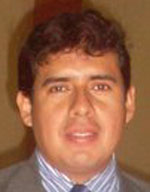New York, July 14, 2011–The Committee to Protect Journalists condemns the sentencing of Peruvian television journalist Hans Francisco Andrade Chávez to two years in prison on criminal defamation charges stemming from a March 2 report concerning a local government official.
Andrade Chávez, a reporter for the local affiliate of national television network América, interviewed a member of a local political party who claimed that Chepén deputy public services director Juan José Vásquez Romero had threatened her life, according to local news reports and CPJ interviews. On March 31, Vásquez Romero filed a complaint accusing Andrade Chávez of defamation, local media reports said.
In its July 6 ruling, the court said assertions made in the report were untrue, although the written decision cited no supporting evidence. The journalist told CPJ he sought out Vásquez Romero for comment prior to the story being aired but was unable to reach him. Andrade Chávez said he believes he was singled out due to his previous critical reporting on local government.
A judge also fined Andrade Chávez 4,000 soles (US$1,430), Peruvian press reports said. The journalist told CPJ he would appeal.
“We urge the Peruvian judicial authorities to reverse Andrade Chávez’s conviction on appeal,” said Carlos Lauría, CPJ’s senior program coordinator for the Americas. “Peruvian authorities must immediately implement reforms to eliminate archaic defamation provisions, which run counter to international standards on freedom of expression.”
Criminal defamation prosecutions are not uncommon in Peru. Alejandro Carrascal Carrasco, editor of the Bagua-based newspaper Nor Oriente, and San Lorenzo radio journalist Oswaldo Pereyra Moreno, were both jailed last year on defamation charges stemming from their reporting. Peru’s Supreme Court overturned the decision in Carrascal’s case and freed the journalist. Pereyra was released after an appeals court voided the lower court’s decision on procedural grounds.
Peru’s press laws are out of step with the growing regional consensus that civil remedies provide adequate redress for cases of alleged defamation and journalists shouldn’t be jailed for libel. In December 2009, the Costa Rican Supreme Court eliminated prison terms for criminal defamation. One month earlier, in November 2009, the Argentine Congress repealed criminal defamation provisions in the penal code. And in April 2009, Brazil’s Supreme Federal Tribunal annulled the 1967 Press Law, a measure that had imposed harsh penalties for libel and slander. Courts in Colombia and Chile have also recently ruled against criminal defamation charges.
